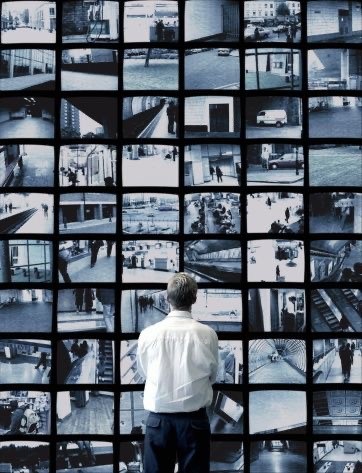In an era rapidly propelled into the digital age, the widespread incorporation of artificial intelligence (AI) in surveillance instigates profound inquiries concerning the impending fate of privacy and personal liberty. George Orwell’s nightmarish portrayal of “Big Brother” within his classic work, “1984,” may have once appeared as a haunting admonition. Nevertheless, in the present day, the fusion of AI and surveillance technologies has irrevocably transformed the spectre of perpetual, all-encompassing surveillance into a disconcerting actuality.
Previously relegated to science fiction, AI-driven surveillance systems have smoothly merged into our everyday lives. The combination of artificial intelligence (AI) with surveillance has given political agencies and business entities an unprecedented level of influence, from the pervasiveness of facial recognition technology to the introduction of predictive policing. These products’ proponents exalt their benefits while praising their enhanced security and operational effectiveness. But it is nevertheless essential to take into account the risk of abuse and the deterioration of individual privacy.

The controversial innovation of face recognition technology is at the centre of the discussion around AI-powered surveillance. This intrusive tool has been avidly adopted by governments, law enforcement organisations, and commercial organisations to perform real-time tracking of people. Although it is promoted as a way to identify wrongdoers and maintain order, it cannot completely allay concerns about widespread mass surveillance. Facial recognition technology has been used by the Chinese government to monitor citizens, serving as a clear example of how it may be used as a weapon for authoritarian control.
Another area where artificial intelligence has a significant impact is predictive policing. These systems use complex algorithms to carefully examine data and make predictions about the areas where criminal activity is statistically likely to occur. While supporters highlight the possibility of optimising law enforcement resource allocation, detractors highlight the danger of entrenching preexisting biases and disproportionately targeting marginalised communities. AI has the potential to exacerbate systemic inequities inherent to the criminal justice system if it is not restrained by strict legislation.
The introduction of AI-driven surveillance is a serious violation of individual privacy. The fundamental idea of privacy is under attack in a society where there are cameras on every street corner, in public transport systems and even inside our homes thanks to pervasive smart devices. These systems can be used to collect vast amounts of data on people, often without their knowledge or permission, and use that data to carefully compile elaborate dossiers on them. This constant monitoring raises important considerations about the fundamental right to be free from unwarranted government interference and the ubiquitous threat of corporate surveillance.
The junction of artificial intelligence and surveillance unfurls a foreboding vista for democracy. In an epoch where governments possess the means to potentially scrutinise the every action of their citizenry, the practice of dissent and political advocacy assumes an increasingly hazardous mantle. The chilling dampening of free speech and the suppression of political opposition stand as stark testaments to the perils looming over unbridled surveillance. The nightmarish trajectory toward an Orwellian future, characterised by unbridled governmental authority, is not a mere dystopian abstraction; it looms menacingly if we fail to earnestly grapple with these concerns.

It is crucial to understand that AI-driven surveillance is not necessarily nefarious it can have genuine uses for enhancing security and promoting the general good. However, the implementation of strict regulatory measures is essential to avoid the transformation of dismal prospects into reality. The protection of individual rights and the maintenance of a just and free society depend on laws limiting the collection, use, and retention of data as well as the unavoidable transparency of AI algorithms.
In addition, it is critical to recognise the crucial importance of public awareness and persistent advocacy in guiding the careful application of AI in the surveillance domain. Citizens and civil liberties organisations must vehemently demand that both governmental and corporate entities demonstrate a profound sense of accountability. We can only hope to achieve a healthy balance between security and the inviolability of privacy through active participation in these conversations and the relentless pursuit of moral frameworks.
The ascendance of AI-powered surveillance ought to be met with neither indifference nor complacency. The allure of convenience and potential advantages should not cloud our discernment to the inherent hazards it poses to individual privacy, civil liberties, and, indeed, the very bedrock of democracy itself. The once distant spectre of ‘Big Brother’ is no longer confined to the realm of speculative fiction; it lurks ominously on the horizon as an impending reality. Urgent action is imperative to establish stringent regulations and fortified safeguards, thus averting the transformation of AI-powered surveillance into a nightmarish actuality. The trajectory of freedom and privacy within the digital epoch hinges inexorably upon our collective determination to shield these quintessential rights.
Sources
- https://medium.datadriveninvestor.com/the-dark-side-of-ai-exploring-potential-misuses-and-dystopian-scenarios-989a261053f6#:~:text=In%20a%20dystopian%20scenario%2C%20governments,stifle%20dissent%2C%20and%20manipulate%20behavior.
- https://www.linkedin.com/pulse/ais-shadow-dawn-dystopia-democracy-dictatorship-2030-%C3%A4ngeslev%C3%A4?utm_source=share&utm_medium=member_ios&utm_campaign=share_via
- https://carnegieendowment.org/2019/09/17/global-expansion-of-ai-surveillance-pub-79847
- https://www.zdnet.com/article/2084-what-happens-when-artificial-intelligence-meets-big-brother/
- https://www.amnestyusa.org/updates/big-brother-in-practice-an-overview-of-unlawful-surveillance/




